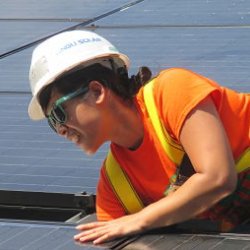Veterans from Perry Technical Institute in Washington state traveled to Sacramento earlier this year for Solar Spring Break through the Veterans Conservation Corps (VCC). Kim Pham, a Navy veteran, former GRID volunteer and the VCC internship program coordinator with the Washington State Department of Veteran Affairs, led the group. In honor of Veterans Day, check out our interview with Kim about her experience with GRID and her journey after service.
Tell us about your experience working with GRID?
It’s pretty incredible. When I first got out of the Navy, I actually volunteered with GRID for a little over a year and became one of their team leaders. I was up on the roof a lot, it was really fun. So, it’s great to be back here with a group of veterans from Washington.
What drew you to volunteer with GRID two years ago?
I was actually a nuclear engineer with the Navy. I was still really interested in energy, but didn’t want to do nuclear energy anymore, and I was really interested in solar. GRID was great because they let me get on the roof and do pretty much every part of the install right away. I felt like a part of the team and I learned really fast. So it was just a great segway into the solar industry, which I had no prior experience with before.
What has it been like being back and bringing students from Perry Tech here?
When I got on the roof the first day, I was like, this feels great. I remember what this feels like. And it was cool to see all the new technology. The new inverters, the new racks, and to see how fast technology has changed just in the last two years. Regarding bringing the veterans from Perry Tech, [some of] these guys are in a trade school and a couple of them are becoming electricians so there’s some really relevant experience for them here. None of them had ever installed a solar system before. I think it exposed them to a new experience and I think they all appreciated that a lot.
Earlier you were talking about your journey after service. Can you tell us what service means to you?
Service, to me, is all about building community. Building, not necessarily equality, but equity. Speaking of solar energy for example, its an energy that requires a lot of up-front capital and that’s not what a lot of people have and so for low-income families I think this is something that gives them the opportunity to have access to some great renewable energy that they didn’t have a chance to get before.
What can you tell either active-duty service members or veterans about getting involved in the solar industry?
I think everything can be service-driven and I think GRID is really doing a great job in terms of connecting service-related work to building solar systems for low-income families. There’s the technical side of things too. If you just think about installing a solar system, there’s a lot of technical knowledge and skills that are really useful to have and so I think that’s one incentive to work in solar. Also in terms of the environment, you’re providing renewable energy to your community. And so I think that in itself is worth it.
Anything else you want to say?
I love GRID! Thank you GRID for all the things you guys have done. You’re an incredible organization. I had just a lot of fun with GRID and that’s the best part.
An interview with Kim Pham, volunteer extraordinaire, and U.S. Navy veteran

